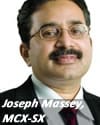India's newest exchange MCX-SX is working to raise low volumes in cash equities and derivatives, including a move to strengthen its Liquidity Enhancement Scheme to incentivise market making and help challenge the duopoly of the National Stock Exchange (NSE) and the smaller Bombay Stock Exchange (BSE).
Joseph Massey, CEO of MCX-SX, told theTRADEnews.com the new bourse's vision encompasses, "creating an investment culture in India, promoting bonds amongst retail investors, bringing retail investors back to the markets, offering superior options for hedging to corporates and developing markets for small- and medium-sized companies."
The combined cash and derivatives volumes on MCX-SX have fluctuated between 70 and 200 million rupees (US$1.28 million and US$3.7 million) in recent weeks – a small fraction of NSE and BSE volumes, though up from the levels of the early days after its launch two months ago on 11 February.
"We have recently commenced the Liquidity Enhancement Scheme and we're receiving increasing support from our members and market participants which has also been witnessed in the week since we launched the scheme," said Massey.
Brokers and investors get incentives to put cash trades through MCX's platform that will amount to around two-thirds of India's Securities Transaction Tax (STT), under the scheme, and more than a third of the STT on equity futures trades. The STT itself is to be reduced across most asset classes, including a cut of nearly half on equity futures, the government announced in its February budge - a move welcomed by industry.
On 18 April, a further set of incentives will become available for clients who trade more than 1 million rupees (US$20,200) in cash and 10 million rupees in futures a month, and execute at least one order a day.
Rival exchange BSE has been running its own Liquidity Enhancement Incentive Programme for several years in an attempt to boost volumes.
MCX's growth strategy is based on "growing the market pie and harnessing the latent potential of our markets," rather than just taking volumes from the incumbent exchanges, according to Massey.
Increased competition will lead to reduced costs and better services, says Massey, citing the examples of deregulation in India's banking sector, as well as its telecoms industry, "which saw a drastic lowering of telephone charges, improved services and wider penetration when more telecom companies came to operate in the sector."
Massey says India's capital markets need to diversify and have significant potential to grow "vital segments such as corporate bonds or SME capital markets."
"What we have today is a highly skewed market structure that does not help us pursue sustainable growth," he added.
"We are particularly passionate about developing the bond market, which is a great opportunity for financing India's growth. The Chinese exchanges, which hardly had any bond market activity two decades ago, have five types of bonds -government, public enterprise, corporate, warrants and convertible - being traded with a yearly turnover of about US$700 billion," noted Massey.
MCX can attract foreign investors by helping improve the overall market structure in India, through offering a wider range of liquid asset classes, believes Massey.
"This will serve the dual purpose of restoring the confidence of retail investors, as well as including them in the larger task of nation building. As the confidence of the retail investor is restored, domestic institutional investors (DIIs) and foreign institutional investors (FIIs) will continue to see new opportunities," says Massey.
In its attempts to create an investment culture and broaden the investor base MCX plans to expand its reach across the country, something it has already begun with "discounted membership offering for professional and rural entrepreneur members."
Despite the relatively low-key first couple of months for the upstart exchange, Massey believes it is headed in the right direction.
"We believe in the philosophy of healthy and steady growth of the market on a solid foundation. Exchanges are critical market infrastructure projects and one has to take a long-term view while creating these institutions. We have seen steady increase in participation and volumes since inception."
